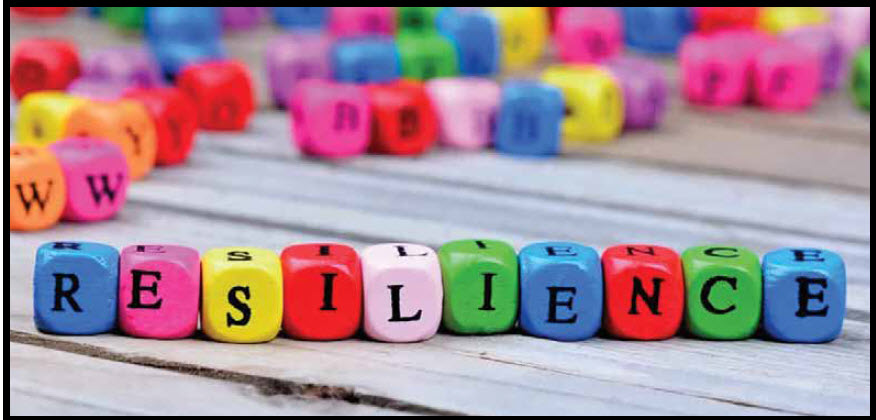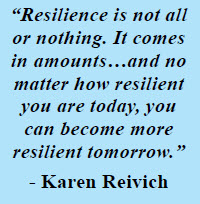Building Resilience
 By: Lisa Philippart
By: Lisa Philippart
Resilience is a psychological quality that allows some people to be knocked down by the adversities of life and come back at least as strong as before. Rather than letting difficulties, traumatic events, or failure overcome them and drain their resolve, highly resilient people find a way to change course, emotionally heal, and continue to move toward their goals. So, what creates resilience? Psychologists have been able to identify some factors that appear to make people more resilient, such as positive attitudes, optimism, ability to regulate emotions, and the ability to see failure as a way to form helpful feedback. For example, optimism has been shown to help soften the impact of stress on the mind and body following disturbing experiences. Optimism allows people access to their own cognitive resources, which enables more cool-headed analysis of what might have gone wrong…leading to consideration of actions that might be more productive. People who have undergone trauma can be, and often are, highly resilient. There does appear to be a genetic predisposition for reliance, but early environments and life circumstances, like trauma, play a role in how resilient genes are ultimately expressed. While many factors can’t be modified (like genetics), specific resilience-building skills can be learned. These include breaking out of negative thought cycles and looking for upsides when faced with setbacks.


What is resilience-building? Getting through pain and disappointment without becoming overwhelmed isn’t necessarily easy for anyone. For instance, do you attribute personal or professional setbacks solely to your own inadequacies, or are you able to identify contributing factors that are specific and temporary? Are you demanding of perfection, or are you able to accept that our lives are a mixture of losses and wins? Healthy habits, such as getting enough sleep, eating well, and exercising, can reduce stress, which may in turn boost resilience. Being sure to nurture close relationships can help improve strength and support when trouble arises. Not surprisingly, regularly thinking about your own morals and actively living according to those values have been linked to a higher resilience. As we are discovering, any crisis, such as the coronavirus pandemic, can test resilience. Looking to loved ones for help and emotional support, increasing self-care, and focusing on the aspects of the situation that are under your control, can help you weather the storm.

How does failure help? To fail is deeply human. People, no matter their backgrounds, skill sets, or life stories, will fail spectacularly at least once in their lives. This doesn’t mean that experiencing a major loss or setback is easy or fun, or that it is accepted in a win-at-all-costs culture that prioritizes success no matter what. But learning to be okay with making mistakes, big or small, is a critical skill tied not only to resilience, but also possibly to future success. You don’t have to pretend that it’s pleasant to fail, or ignore the frustration that arises when a goal falls out of reach. Instead, accept the emotions that come with the setback, being curious about why things went wrong, and go forward with how you can improve in the future. (Practicing self-compassion will help too!) Choosing to be okay with making mistakes helps build better emotion regulation, which is beneficial in a wide variety of domains from relationships to the workplace. Further, evaluating and accepting a setback can provide lessons that will stop failures from repeating themselves in the future. Many successful people report that they moved past early failures by avoiding the negative thinking or ruminating traps. Take some time to self-reflect, and evaluate your level of resilience. The rest of your life depends on it!
By: Lisa Philippart
Licensed Professional Counselor